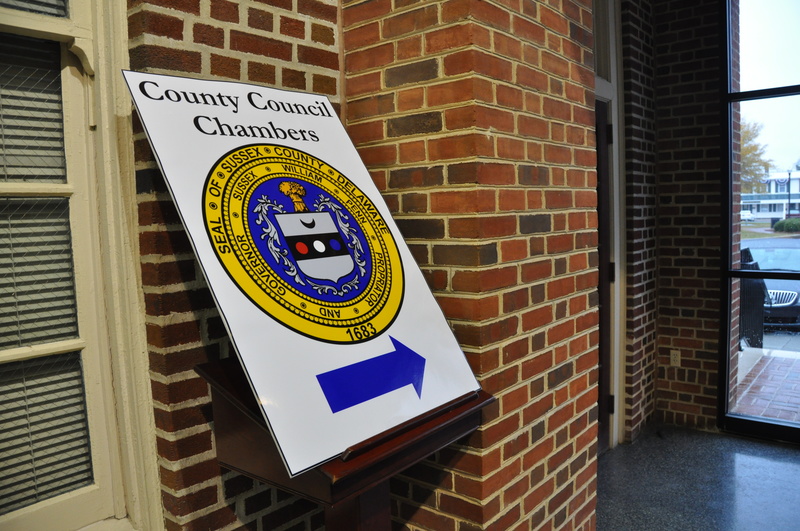If you want to speak to Sussex County Council during its public comment period, prepare to wait. How long? It's anyone's guess.
Council has changed the timing of public comment at meetings – a change that is drawing public criticism. The public now has to wait until after council returns from executive sessions – and no one knows how long each executive session will last.
One regular speaker at council meetings has filed a Freedom of Information Act complaint with the Delaware Attorney General's Office against the agenda change. Dan Kramer of Greenwood says a public vote by council members was required to make the agenda change. Sussex officials dispute that claim.
|
|
It's rare that council does not have an executive session during a meeting. Executive sessions can last a few minutes or beyond an hour depending on what is being discussed. For many years, the period for public comment occurred before council recessed for executive session.
Under a new policy initiated in September, public comment was moved to after executive sessions. If the president determines that the executive session will be time-consuming, the agenda can be modified to allow public comment before the executive session. That has occurred at least once since September.
County Administrator Todd Lawson said the decision to make the change came from county council members. “It's up to council how best to run meetings,” Lawson said.
Lawson said the reason a vote was not taken in public on the agenda switch relates to the county's rules of procedure, which dictate how council operates.
If the council wanted to change the reading of correspondence from the beginning of the agenda to the end of the agenda, a vote would be required, Lawson said.
That's because that agenda item is specifically listed in the rules of procedure, he said. “Executive session and public comment are not listed in the order of business, so no vote is required to change their order on an agenda. This is the way we interpret the rules,” Lawson said.
The League of Women Voters of Sussex County has issued a statement calling the agenda switch puzzling; the organization has gone on record opposing the change. In the past, the league has applauded council for allowing public comment during council meetings.
“Since the duration of the executive session fluctuates, anyone who may wish to address the council must wait for an indeterminate period of time. This change effectively limits public comment. Clearly, the waiting time deters working citizens from participating in county government, and hourly workers are put at a particular disadvantage,” the league wrote in its statement.
Lawson said the policy is subject to discussion by council in 2015. He said an unintended consequence of the change is that the public has no idea when council will return from an executive session. “It's not a perfect system, and I'm not sure it will stay the way it is. The new council may choose to review the rules of procedure,” Lawson said.
No legal requirement for public comment
Sussex officials point out council is not legally required to schedule public comment other than during an advertised public hearing.
“This is a courtesy council provides; it's not mandated,” Lawson said. “There are pros and cons to having it and then trying to tweak it. But, I think striking it away would be bad policy.”
Members of the public are allowed to speak to council for three minutes at the end of meetings. Chip Guy, the county's communications director, said it makes more sense to have the public comment period after council has conducted all its business, which would be after executive sessions.
“We felt this was more logical and appropriate so that all matters can be brought before council before taking any concluding business,” Guy said. “Just because council retreats to an executive session doesn’t mean there won’t be additional business to then come back to.”
Requests to return to previous agenda
At least two regular speakers at council meetings do not see it the same way.
Kramer – who addresses council at most meetings – said he's convinced the change was done to silence him. “If they are doing this to get back at me, it's wrong to penalize other members of the public,” Kramer said. “You can't leave. You can't even afford to go to the bathroom because they might come back and adjourn before you get back.”
“How long do they want us to sit here?” he asked.
Kramer said he has no doubt a vote was required to make the agenda change. “They need to suspend the rules and take a vote to make a change,” he said. “If I'm not correct, I would not have filed a complaint.”
Another frequent speaker at council meetings, Paul Rieger, who lives near Georgetown, said people won't wait when there is no guarantee how long an executive session will last. “The public will leave. It's disrespectful to the public. Why not put the people first?” he asked.
Kramer and Rieger have asked council to return to its previous agenda policy.
The league is also asking council to reinstate its former policy. “While the reasoning leading to this agenda change is unclear, we hope that council members will consider how their constituents may perceive the decision. We trust that our elected representatives value the opportunity to hear from their constituents on issues that do not require an official public hearing,” wrote Jane Lord, league president.





















































